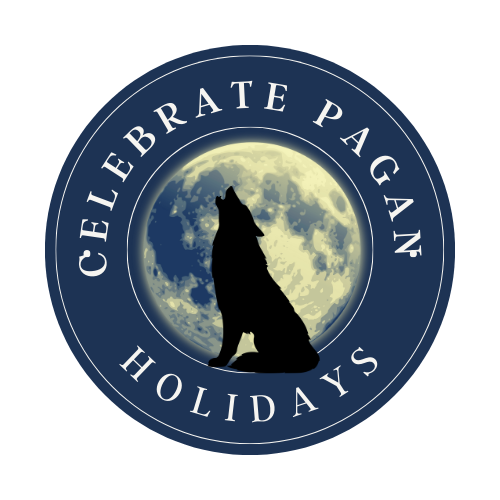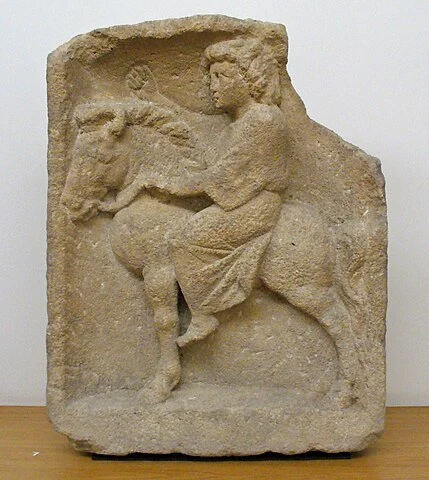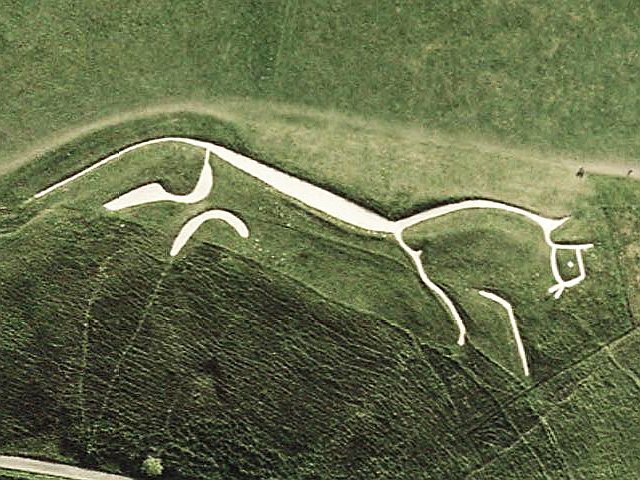Epona was an important deity in the pantheon of Celtic gods and goddesses. She was known specifically as the goddess of horses and was revered as both a protector and a provider of horses for the Celtic people. The word Epona means Great Mare or Divine Mare.
Equines (horses, donkeys, and mules) were important animals in history. They were work animals and used for transportation. Horses are connected with leadership, trust, and freedom.
Learn more about her and how we can honor her today.
How Do We Know About Epona?
Not a lot of stories remain about Epona although she is widely represented in artifacts.
Despite the popularity of her cult, little is known about Epona's origins and the specific rituals associated with her worship. Some scholars believe that she may have been a regional deity who was later adopted and modified by other Celtic communities.
Other theories suggest that she may have been a goddess of the underworld, associated with the horse as a symbol of death and rebirth.
Artwork representing her riding or standing with a horse has been found throughout Northern Europe and attests to her importance.
I can almost hear her saying charge when I look at this one. No wonder the Roman calvary adopted her as their patron goddess. Epona, second or third century AD, from Contern, Luxembourg. Photo credit: Owen Cook
Celtic Goddess Epona in Art
Epona is a Celtic goddess known for her association with horses, fertility, and abundance. In art, Epona is usually depicted as a young and beautiful woman, often accompanied by a horse or riding a horse.
One of the most common representations of Epona in art is the statue of Epona with a horse. These statues were usually found near stables, shrines, or on the sides of roads.
Another common representation of Epona is a relief carving of her seated on a horse, sometimes with a foal by her side. These carvings were often found in temples or shrines dedicated to the goddess.
The relief carvings are usually very detailed, with intricate patterns on Epona's dress and the horse's bridle.
Epona is also depicted on some Celtic coins. On these coins, Epona is shown seated on a horse, holding a cornucopia, and sometimes accompanied by a bird. These coins were usually minted during the reign of the Roman Empire.
EPONA CORRESPONDENCES
Culture: Celtic/Gaulish
Symbolic Meaning: fertility, horses, protection
Ruling Planet: Mars, Mercury
Ruling Element: Air, Fire
Season: Summer
Corresponding Star Sign: Leo
Animals/Mythological Creatures: Birds, Dogs, Donkey, Horses, Mules
Birds:
Plants: cyclamen, geranium, hazel, mandrake, mustard, roses
Trees: Apple, oak, pine
Foods: Apples, Carrots, Grains, Nuts
Crystals: Moonstone, Pumice, Sard, Tourquis
Herbs & Scents: Rose, Sandlewood
Tools: keys
Color: White, Brown, Gold
Day: December 18, Tuesday, Wednesday
Tarot:
Consort: None
Epona And Horses
Her connection to horses was not limited to a physical relationship with them; rather, Epona was believed to have an intimate spiritual tie to the animals.
Check out my article on The Horse Spirit Animal: A Complete Guide
She was considered the “Lady of the Horses,” and her influence over them extended beyond the earthly realm.
As the goddess of horses, Epona held a special place in the hearts and minds of the Celtic people. Horses represented status and wealth, and they played an essential role in transportation and warfare. Epona was considered a generous provider of horses and was often invoked for blessings and assistance in horse breeding and training.
Uffington White Horse
It is unknown if the Uffington White Horse is associated with Epona. This monument was created in England between 1380 and 550 BCE. It was created by digging trenches and filling them with white chalk.
Sattelite view of the Uffington White Horse. Photo credit USGS
Fertility
Despite her association with horses, Epona was not limited to this role. She was also considered a fertility goddess, associated with pregnancy, childbirth, and abundance.
Some Celtic traditions linked Epona to agriculture and the harvest, indicating her connection to the cycle of life and death.
Epona also represents fertility. Foals in her artwork symbolize birth.
Epona is often portrayed holding a cornucopia, which symbolizes abundance, or a key, which symbolizes the opening of gates, both relating to her ability to provide fertility and abundance.
In addition, some statues have been found where Epona lies naked on the back of a horse.
Check out my YouTube Channel
Epona and Rome
Epona’s role with horses in Gaul (France) led to her connection and worship in Roman mythology.
Epona's cult was particularly popular among the Roman cavalry, who identified her with their own goddess, Venus, due to the similarities between the two goddesses. As a result of the Roman conquest, Epona's worship spread throughout the Roman Empire, and her image was often depicted on coins, seals, and other artifacts.
Roman soldiers stationed in Gaul and Britain adopted her as their goddess of choice and spread her worship throughout the regions they occupied. Her statues are often found in the stables for military horses.
Epona’s popularity extended beyond the Celtic lands, and her cult spread throughout the Roman Empire. She even had a shrine at the Imperial Stable and was referred to as Epona Augusta. This shows she was associated with the Empire and with sovereignty.
Epona and The Common People
Epona has an important role in the Celtic belief systems of the common person. Small statues have been found in many rural areas across Great Britain and Northern Europe.
As a goddess of fertility, abundance, and protection, she was often called upon for help in matters related to agriculture and animal husbandry and also served as a guardian of people and communities.
Epona and her horses, from Köngen, Germany, about 200 AD. Photo credit: Rosemania
Is Epona the Deliver of Souls in Celtic Mythology
According to Celtic mythology, Epona is best known as the protector of horses, but she is occasionally associated with being the deliverer of souls. There is some controversy with this theory.
This may be something that developed after Nordic religions became more established in Great Britain and northern Europe. Horses were prominent in Norse Religion such as Odin and his stead Sleipnir.
Carried by a horse the symbol of transportation, she evokes the journey the soul takes into the underworld. The belief in a deliverer of souls is also common in Greek and Roman mythologies, where there are gods and goddesses tasked with escorting souls to the afterlife.
Her influence extended beyond the realm of the living, too. Epona was also believed to protect the spirits of horses after they had crossed over into the afterlife.
It is believed that her association with death and the afterlife may have influenced Celtic beliefs and practices surrounding death and burial. Statues of her have been found in graves and depictions on funeral stones.
One possible connection to funerary customs is the presence of horse imagery on Celtic tombstones and grave markers. As Epona is closely associated with horses, it is possible that she was invoked in funeral rituals to ensure safe passage to the afterlife.
Relationship With Rhiannon
The Welsh goddess Rhiannon (meaning Great Queen) is also closely related to horses. Rhiannon may be more of a medieval literary figure than belonging to a Pantheon.
Rhiannon is depicted as a horse and sometimes a mare and foal with her son. She also was associated with accompanying the dead. Her story tells of Rhiannon being accused of killing her infant son.
How to Worship the Goddess Epona
Epona, the Celtic goddess of horses, fertility, and prosperity, is often hailed as a powerful deity in Pagan traditions.
There is an Invocation to Epona in Gaulish and English on Polytheist.com And I have another listed below.
Here are some ways you can worship the goddess Epona and show your devotion to her:
Create an Altar
Creating an altar is a great way to show your devotion to Epona. An example of mine is below.
You can include symbols such as horse figurines, images of the goddess, flowers, and candles in her colors of white, brown, and gold.
I have pictures of the ponies I had as a young child and a horse carving my father made. Rose petals and turquoise.
My Altar to Epona. Photo Ame Vanorio
Offerings
Making offerings to Epona is a way of showing gratitude for what she has brought to your life. You can offer her apples, oats, carrots, or other fruits and grains that horses like to eat. Wine or honey could also be used as an offering.
Feast Day is December 18 (Roman)
Meditation
You can meditate on Epona and her qualities, such as her strength, fertility, and nurturing power. Focus your thoughts on her while meditating. You can also ask for her guidance or blessings.
Nature Walks
Epona is strongly associated with nature and the outdoors. Take a walk through nature, preferably through pastures, and focus on the sights and sounds around you. Note any animals or plants that remind you of Epona.
Support Horse Rescue
There are several ways and organizations to support horse rescue in the USA.
Rescuing thoroughbreds from abuse and injury at racetracks
Rescuing and providing habitat for wild mustangs
Stopping the horse meat industry
“Invocation
Hail, Mother of horses!
Hail, Lady whose children
Are the embodiment of the wind
And come like fire and thunder
Across field and plain.
Carry us, Lady,
As you carried our ancestors
Across rivers and continents,
As you carry our dreams
And nightmares,
Carry our wishes and hopes,
Bear us to adventure
And safely back home again,
And may we never stop running
Toward the far horizon
Of possibility.”
This is one of my most popular YouTube videos!
My Relationship With Epona
If you follow my writings you know that I have close relationships with nature and animal goddesses. Artio Celtic Bear Goddess and Bastet Egyptian Cat Goddess are two that I honor in my personal practice as a pagan.
Epona is one that I feel I have been drawn to my whole life but only recently started to put that into a concrete form. Obviously, I love horses, especially my boy Rocket as seen below.
Worshiping the goddess Epona is a deeply personal practice. Remember to acknowledge her strength, reliability, and nurturing qualities in your prayers and offerings.
Epona can be a powerful ally in your journey toward becoming a better person, so trust in her guidance and blessings.
Author, Ame and Rocket, Photo by Ame Vanorio











Horses running through a field make a beautiful and majestic sight and are a powerful animal guide. Humans have long been enamored with and aligned with the horse as a means of transportation. In fact, this spirit animal has been instrumental in driving cultural advancements.
I was raised on a horse farm in Kentucky and have a special connection with horses. My own horse, Rocket, is a rescue, a pet, and one of my best friends.